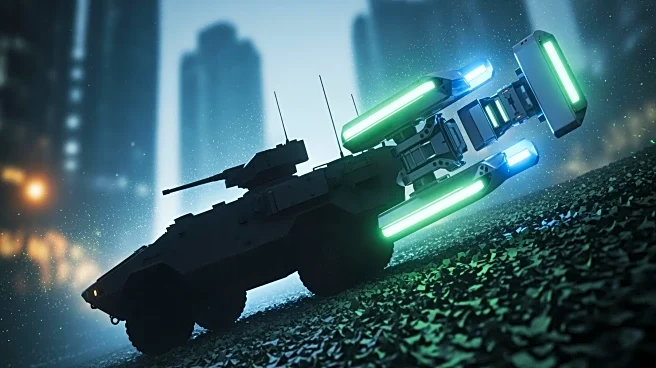What's Happening?
L3Harris Technologies has successfully integrated its Corvus electronic warfare (EW) system onto Rheinmetall vehicles, showcasing this advancement at the Defence and Security Equipment International (DSEI)
2025 exhibition. The integration aims to provide real-time detection and countermeasures against threats such as unmanned aerial vehicles (UAVs), jamming, and electronic attacks. The vehicles, referred to as Shadow Wolf, are equipped with L3Harris's AN/PRC-167 multichannel radio and AN/PRC-160(V) HF/VHF tactical radio, which enhance the Corvus system's capabilities by allowing operations in hostile EW environments with low probability of intercept and detection. This development is part of a broader strategy to integrate these radios with the British Army's Bowman communications architecture, addressing obsolescence concerns in existing systems.
Why It's Important?
The integration of the Corvus EW system on Rheinmetall vehicles represents a significant advancement in military technology, potentially enhancing the U.S. defense sector's capabilities in electronic warfare. By providing real-time detection and countermeasures, the system could improve the safety and effectiveness of military operations, particularly in environments where electronic threats are prevalent. This development may also influence future defense contracts and collaborations, as L3Harris works with General Dynamics UK on further integration projects. The ability to operate in hostile environments with low probability of detection is crucial for maintaining strategic advantages in modern warfare.
What's Next?
L3Harris plans to continue its collaboration with General Dynamics UK to integrate its radios with the British Army's Bowman communications architecture. This ongoing effort aims to address obsolescence concerns and enhance the capabilities of existing systems. Additionally, the company is involved in the revival of the U.S. Army's Lower-Tier Future Interceptor program, which could lead to further advancements in defense technology. As these projects progress, stakeholders in the defense industry, including military leaders and defense contractors, will likely monitor the outcomes closely to assess potential impacts on future military strategies and procurement decisions.
Beyond the Headlines
The integration of advanced electronic warfare systems like Corvus could have broader implications for military strategy and defense policy. As electronic threats become more sophisticated, the ability to counteract them effectively is increasingly important. This development may prompt discussions on the ethical use of electronic warfare technologies and their impact on international relations. Furthermore, the integration of autonomy and AI in defense systems, as pursued by L3Harris, could lead to long-term shifts in how military operations are conducted, potentially reducing the need for human intervention in certain scenarios.









